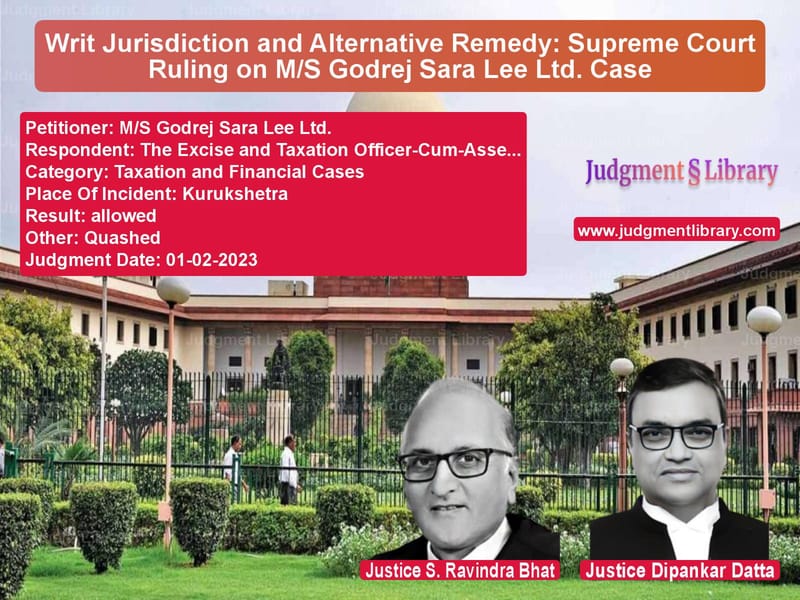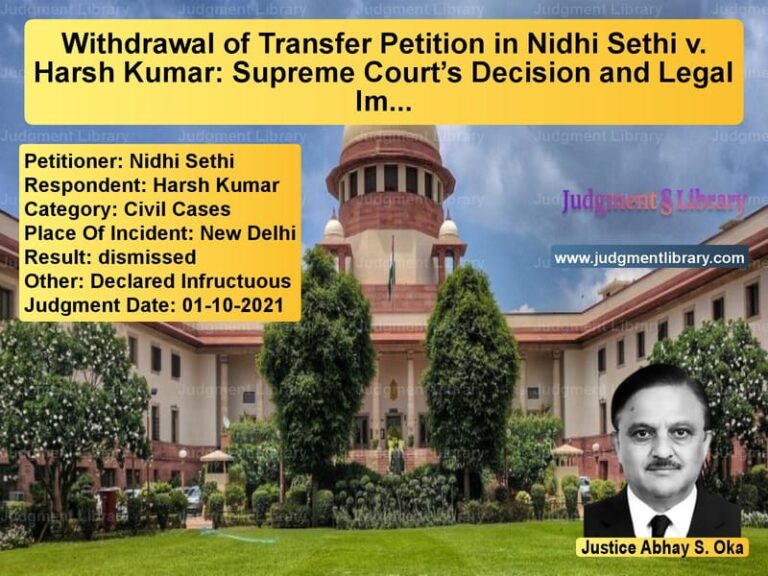Writ Jurisdiction and Alternative Remedy: Supreme Court Ruling on M/S Godrej Sara Lee Ltd. Case
The Supreme Court of India has delivered a landmark judgment in the case of M/S Godrej Sara Lee Ltd. vs. The Excise and Taxation Officer-Cum-Assessing Authority & Others. The case revolves around whether a writ petition is maintainable when an alternative remedy exists under the Haryana Value Added Tax Act, 2003 (VAT Act). The decision provides a clear legal precedent on when courts should exercise discretion in entertaining writ petitions despite the availability of an alternative statutory remedy.
Background of the Case
The appellant, M/S Godrej Sara Lee Ltd., challenged an order from the Punjab and Haryana High Court, which dismissed its writ petition on the grounds that it had an alternative remedy under Section 33 of the VAT Act. The primary legal questions in this appeal were:
- Whether the High Court was justified in declining interference due to the existence of an alternative remedy.
- If not, whether the Supreme Court should remit the writ petition to the High Court for a fresh hearing or decide the matter itself.
The appellant had contested the jurisdiction of the Deputy Excise and Taxation Commissioner (ST)-cum-Revisional Authority (Revisional Authority) in reopening tax assessment proceedings through suo motu revisional powers under Section 34 of the VAT Act. The Revisional Authority had modified two assessment orders dated February 28, 2007, arguing that the Assessing Authority erred in applying a 4% tax rate on mosquito repellents instead of 10%.
Arguments by the Appellant
The appellant contended that:
- The Revisional Authority lacked jurisdiction to reopen the assessment orders, which were already finalized.
- The assessment orders were legally correct, and the revisional action was beyond the authority’s scope.
- The VAT Act did not empower the Revisional Authority to interfere in assessments where the issues had been conclusively settled.
- The alternative remedy rule is a matter of discretion and not an absolute bar to the writ jurisdiction of the High Court.
- The High Court’s reliance on Titagarh Paper Mills vs. Orissa State Electricity Board was misplaced because that case involved a contractual arbitration clause, not a statutory tax dispute.
Arguments by the Respondent
The respondents argued that:
- The appellant had an alternative remedy under Section 33 of the VAT Act, which it had not pursued.
- The High Court correctly dismissed the writ petition based on the settled principle that when a statutory remedy is available, writ jurisdiction should not be invoked.
- The Revisional Authority had acted within its legal powers under Section 34 of the VAT Act to correct errors in assessment.
- The Assessing Authority’s classification of mosquito repellents under a 4% tax rate was incorrect and required correction.
- The decision of the Revisional Authority was justified based on the Supreme Court’s earlier ruling in Sonic Electrochem vs. STO, which had held that mosquito repellents are general taxable goods and not classified as insecticides.
Supreme Court’s Observations
The Supreme Court analyzed the High Court’s decision and made several key observations regarding the exercise of writ jurisdiction under Article 226 of the Constitution:
- “The power to issue prerogative writs under Article 226 is plenary in nature. Any limitation on the exercise of such power must be traceable in the Constitution itself.”
- “Article 226 does not impose any restriction on the exercise of writ jurisdiction merely because an alternative remedy exists.”
- “Availability of an alternative remedy is not an absolute bar but a rule of convenience, discretion, and judicial policy.”
- “A writ petition should not be dismissed outright if an exceptional case is made out.”
The Court reiterated the exceptions where a writ petition can be entertained despite an alternative remedy:
- When the petition seeks enforcement of a fundamental right.
- When there is a violation of principles of natural justice.
- When the order under challenge is wholly without jurisdiction.
- When the vires of an Act is challenged.
In the present case, the Supreme Court held that the High Court erred in dismissing the writ petition without considering whether an exception applied. Since the appellant raised a jurisdictional issue regarding the Revisional Authority’s power, the High Court should have examined the matter on merits.
Final Judgment
The Supreme Court set aside the High Court’s order and ruled in favor of the appellant. The Court held:
- “The High Court committed a manifest error of law by dismissing the writ petition without considering the jurisdictional challenge.”
- “The Revisional Authority lacked the power to interfere with the assessment orders, which had attained finality.”
- “Once a legal issue is settled by an appellate tribunal, the Revisional Authority cannot reopen it unless overturned by a superior court.”
- “The appellant’s tax liability had been correctly determined at 4%, and the revisional orders imposing a 10% tax rate were illegal.”
Therefore, the Court invalidated the revisional orders and restored the original assessment orders. The appeal was allowed, and the respondents were directed to comply with the judgment.
Petitioner Name: M/S Godrej Sara Lee Ltd..Respondent Name: The Excise and Taxation Officer-Cum-Assessing Authority & Others.Judgment By: Justice S. Ravindra Bhat, Justice Dipankar Datta.Place Of Incident: Kurukshetra.Judgment Date: 01-02-2023.
Don’t miss out on the full details! Download the complete judgment in PDF format below and gain valuable insights instantly!
Download Judgment: ms-godrej-sara-lee-vs-the-excise-and-taxat-supreme-court-of-india-judgment-dated-01-02-2023.pdf
Directly Download Judgment: Directly download this Judgment
See all petitions in Income Tax Disputes
See all petitions in Tax Evasion Cases
See all petitions in Judgment by S Ravindra Bhat
See all petitions in Judgment by Dipankar Datta
See all petitions in allowed
See all petitions in Quashed
See all petitions in supreme court of India judgments February 2023
See all petitions in 2023 judgments
See all posts in Taxation and Financial Cases Category
See all allowed petitions in Taxation and Financial Cases Category
See all Dismissed petitions in Taxation and Financial Cases Category
See all partially allowed petitions in Taxation and Financial Cases Category







